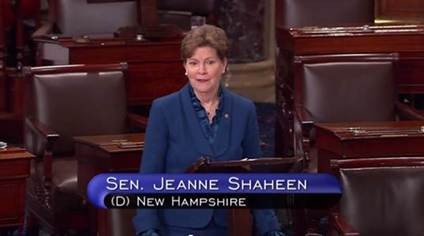SHAHEEN, ISAKSON, INTRODUCE BIENNIAL BUDGETING LEGISLATION TO REFORM CONGRESS’ BROKEN BUDGETING PROCESS
View today’s remarks by Sens. Shaheen and Isakson on introduction of the bill online here
WASHINGTON – U.S. Senators Jeanne Shaheen (D-NH) and Johnny Isakson (R-GA), today reintroduced the bipartisan Biennial Budgeting and Appropriations Act in an effort to reform Congress’ broken budgeting process. The legislation would convert Congress’ annual appropriations process to a two-year budget cycle.
This commonsense reform would require Congress to become better stewards of the taxpayers' money by placing Congress on a two-year budget cycle, with one year for appropriating federal dollars and the other year devoted to oversight of federal programs.
“Our biennial budgeting legislation offers a bipartisan, pragmatic reform to our country’s broken budget process,” Shaheen said. “In New Hampshire we’ve seen firsthand that biennial budgeting works, and it’s time to bring this common-sense reform to Washington. Our bipartisan proposal will allow for better oversight of taxpayer dollars and a more thoughtful budget process with fewer opportunities for manufactured crises. We should act on our proposal now.”
“I’m proud to join Sen. Shaheen in reintroducing this bipartisan, commonsense legislation that would change the paradigm of Washington’s broken budget system,” said Isakson. “With our national debt surpassing $18 trillion and growing, it is imperative that we rethink the way that we do things in Congress. I have pushed biennial budgeting every year I’ve been in the Senate since 2005 because this new system would increase oversight and reduce spending, making our federal government more efficient and more accountable to taxpayers.”
Isakson is making S.150, the biennial budget legislation, his first bill of the new Congress in an attempt to tackle one of the biggest problems facing our country – our unsustainable debt.
In 2013, the Isakson-Shaheen proposal passed by a 68-31 vote in the Senate as an amendment to that year’s budget resolution, which is a non-binding blueprint.
The legislation requires the president to submit a two-year budget at the beginning of the first session of a Congress. Members of Congress would then need to adopt a two-year budget resolution, a reconciliation bill if necessary and two-year appropriations bills during that first session. The second session of a Congress would then be devoted to the consideration of authorization bills and oversight of federal programs.
The biennial budgeting concept has been endorsed by Republican and Democratic presidents, as well as by numerous federal budget experts. Isakson has supported biennial budgeting proposals every year he’s been in the Senate, while Shaheen has firsthand experience with the efficacy of biennial budgeting from her tenure as governor of New Hampshire, which operates on a two-year budget cycle. Twenty states operate under a biennial budgeting cycle.
Along with introduction by Isakson and original co-sponsorship by Shaheen, 22 other senators have co-sponsored the bill: Sens. Kelly Ayotte, R-N.H., Lamar Alexander, R-Tenn., John Barrasso, R-Wyo., Susan Collins, R-Maine, Mike Crapo, R-Idaho, Mike Enzi, R-Wyo., Deb Fischer, R-Neb., Chuck Grassley, R-Iowa, Martin Heinrich, D-N.M., Ron Johnson, R-Wis., Tim Kaine, D-Va., Angus King, I-Maine, Amy Klobuchar, D-Minn., James Lankford, R-Okla., Joe Manchin, D-W.V., John McCain, R-Ariz., Lisa Murkowski, R-Alaska, David Perdue, R-Ga., Rob Portman, R-Ohio, David Vitter, R-La., Mark Warner, D-Va, and Heidi Heitkamp, D-N.D.
